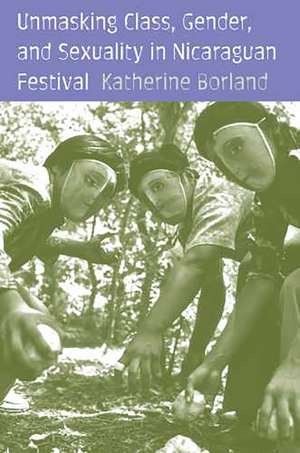Unmasking Class, Gender, and Sexuality in Nicaraguan Festival
Autor Katherine Borlanden Limba Engleză Hardback – 5 mai 2006
Masaya, a provincial capital of Nicaragua, cultivates an aggressively traditional identity that contrasts with Managua’s urban modernity. In 2001 the city was officially designated Capital of Nicaraguan Folklore, yet residents have engaged in a vibrant folk revival since at least the 1960s. This book documents the creative innovations of Masaya’s performing artists.
The first extended study in English of Nicaraguan festival arts, Unmasking Class, Gender, and Sexuality in Nicaraguan Festival is an ethnographically and historically grounded inquiry into three festival enactments during the Somoza, Sandinista, and Neoliberal periods: the carnivalesque torovenado masquerades, the transvestite Negras marimba dances, and the wagon pilgrimage to Popoyuapa. Through a series of interlinked essays, Katherine Borland shows that these enactments constitute a people’s theater, articulating a range of perspectives on the homegrown and the global; on class, race, and ethnicity; on gender and sexuality; and on religious sensibilities.
Borland’s book is a case study of how the oppositional power of popular culture resides in the process of cultural negotiation itself as communities deploy cherished traditions to assert their difference from the nation and the world. It addresses both the gendered dimensions of a particular festival masquerade and the ways in which sexuality is managed in traditional festival transvestism. It demonstrates how performativity and theatricality interact to negotiate certain crucial realities in a festival complex. By showing how one locale negotiates, incorporates, and resists globally circulating ideas, identities, and material objects, it makes a major contribution to studies of ritual and festival in Latin America.
The first extended study in English of Nicaraguan festival arts, Unmasking Class, Gender, and Sexuality in Nicaraguan Festival is an ethnographically and historically grounded inquiry into three festival enactments during the Somoza, Sandinista, and Neoliberal periods: the carnivalesque torovenado masquerades, the transvestite Negras marimba dances, and the wagon pilgrimage to Popoyuapa. Through a series of interlinked essays, Katherine Borland shows that these enactments constitute a people’s theater, articulating a range of perspectives on the homegrown and the global; on class, race, and ethnicity; on gender and sexuality; and on religious sensibilities.
Borland’s book is a case study of how the oppositional power of popular culture resides in the process of cultural negotiation itself as communities deploy cherished traditions to assert their difference from the nation and the world. It addresses both the gendered dimensions of a particular festival masquerade and the ways in which sexuality is managed in traditional festival transvestism. It demonstrates how performativity and theatricality interact to negotiate certain crucial realities in a festival complex. By showing how one locale negotiates, incorporates, and resists globally circulating ideas, identities, and material objects, it makes a major contribution to studies of ritual and festival in Latin America.
Preț: 378.78 lei
Preț vechi: 510.58 lei
-26% Nou
Puncte Express: 568
Preț estimativ în valută:
72.51€ • 74.74$ • 61.14£
72.51€ • 74.74$ • 61.14£
Carte indisponibilă temporar
Doresc să fiu notificat când acest titlu va fi disponibil:
Se trimite...
Preluare comenzi: 021 569.72.76
Specificații
ISBN-13: 9780816525119
ISBN-10: 0816525110
Pagini: 248
Dimensiuni: 152 x 229 x 23 mm
Greutate: 0.49 kg
Ediția:1
Editura: University of Arizona Press
Colecția University of Arizona Press
ISBN-10: 0816525110
Pagini: 248
Dimensiuni: 152 x 229 x 23 mm
Greutate: 0.49 kg
Ediția:1
Editura: University of Arizona Press
Colecția University of Arizona Press
Notă biografică
Katherine Borland is associate professor of comparative studies in the humanities at The Ohio State University at Newark and author of Creating Community: Hispanic Migration to Rural Delaware.
Recenzii
“Borland’s descriptions are delightful, intriguing, and illuminating. This book is truly a fantastic contribution to the ethnographic literature about Nicaragua.” —Les Field, University of New Mexico
“The author presents case studies of a variety of events she has observed and participated in herself. Her field research is first-rate.” —Jack Santino, Director of the Bowling Green Center for Popular Culture Studies
“The author presents case studies of a variety of events she has observed and participated in herself. Her field research is first-rate.” —Jack Santino, Director of the Bowling Green Center for Popular Culture Studies
